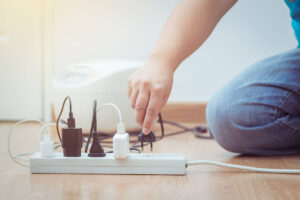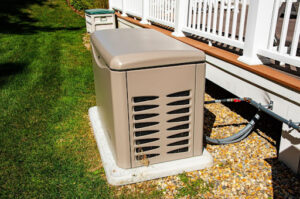
What to Do After Your House Is Struck by Lightning
Lightning strikes can be a terrifying experience for any homeowner. The powerful boom and bright flash are unmistakable, leaving you to wonder about the safety
Did you know that Houston is in the top 5 most humid cities in America? Even in the winter, when most of the country is experiencing cold, dry weather, Houston’s humidity levels are still well above average. Not only does humidity make the air feel warmer and stuffier, it is also a breeding ground for mold, mildew and bacterial growth. These can lead to increased allergy and asthma symptoms, as well as sickness.
Each year, the cold and flu season becomes more and more severe. With indoor air pollution worse than the air outside, indoor air quality (IAQ) plays a large factor in the spread of these viruses and your household’s overall health and comfort. Protect the health of your household this winter by using your home’s humidity levels to improve your indoor air quality. By knowing how humidity affects your home’s IAQ, you can make the subtle adjustments that will make all the difference when it comes to keeping your household healthy.
Your home’s indoor air quality can be significantly impacted by the humidity in your home’s air, and, as a result, affect the health of your household. This becomes increasingly important during the winter months when the days are shorter and cooler and people spend most of their time inside. In the winter, Americans spend about 90% of their time indoors where the pollution can be 2 to 5 times higher than outdoors. In Houston, where our humidity is naturally higher year-round, it is very important to pay attention to your home’s humidity levels to help mitigate indoor air pollution. There are several ways to lower your home’s indoor humidity levels and improve IAQ. Help ensure your family stays happy and healthy with these tips to lower indoor humidity levels.
Due to Houston’s humid environment, the humidity levels inside your home have a greater impact on indoor air quality and health concerns. This cold and flu season, pay special attention to the symptoms of the allergy and asthma sufferers in your home. Use these tips to adjust your home’s humidity as needed. In the winter months, humidity levels can fluctuate and require daily adjustments to your home’s humidity levels.
Controlling indoor air quality is best done with your home’s central heating and air conditioning system. Our certified technicians at Universal Home Experts can help you upgrade your system to have the best air quality possible in your home. Call us today at (713) 364-0226 to schedule an assessment with an IAQ professional.

Lightning strikes can be a terrifying experience for any homeowner. The powerful boom and bright flash are unmistakable, leaving you to wonder about the safety

It’s easy to overlook the silent threats that lurk within the walls of your own home — especially when it comes to the electrical system.

In today’s world, where unpredictability seems to be the only constant, ensuring the reliability and safety of our homes has become paramount. Whether it’s due